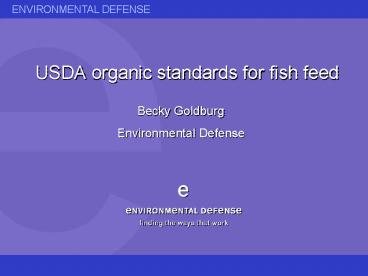USDA organic standards for fish feed - PowerPoint PPT Presentation
1 / 18
Title:
USDA organic standards for fish feed
Description:
Mandate from 1990 Farm Bill -- OFPA. Based on considerable experience of organic farmers ... substance as long as it has not been treated with synthetic preservatives ... – PowerPoint PPT presentation
Number of Views:61
Avg rating:3.0/5.0
Title: USDA organic standards for fish feed
1
USDA organic standards for fish feed
- Becky Goldburg
- Environmental Defense
2
USDA organic standards
- Mandate from 1990 Farm Bill -- OFPA
- Based on considerable experience of organic
farmers - Helped create booming organic marketplace
- Gold standard for consumers
3
(No Transcript)
4
USDA Aquatic Animal Task Force, 2001
Recommendations
- Organic certification not appropriate for wild
fish - Fishing not consistent with principles of organic
production - Certification appropriate for at least some types
of organic production
5
Marine Stewardship Council
6
Organic seafood abroad
- Farmed fish already certified abroad
- Wild fish not certified organic
7
(No Transcript)
8
Organic farmed seafood in the US
- Standards may not be consistent with expectations
of US organic consumers - California legislation bans sale
- Some US retailers will not sell until US
standards established
9
USDA Aquaculture Working Group
- Established in 2005
- Draft organic standards for most aquatic species
- NOSB recommended most provisions in revised draft
to USDA in March 2007 - Draft standards for molluscs, July 2007
10
There is no history of organic aquaculture to
inform standards
11
And organic standards not created
with aquaculture in mind
12
Key controversial issues for US organic standards
- Feed - US standards require 100 organic feed
ingredients for livestock. - Policy issue - Can organic fish be fed diets
containing substantial amounts of fish meal and
oil made from wild caught fish, which are not
organic?
13
Legal background natural substances
- Under OFPA, only natural substances may be used
in organic production, unless synthetic
substances are specifically named on the
"National List" as eligible for use in certain
types of organic production (e.g. for crops).
14
Legal background feed
- Feed supplements are defined in US organic
standards as a combination of feed nutrients
added to livestock feed to improve the nutrient
balance or performance of the total ration and
are intended to be - Diluted with other feeds when fed to livestock
- Offered free choice with other parts of the
ration if separately available or - Further diluted and mixed to produce a complete
feed. - Feed supplements must be organic or natural
substances, except for non-synthetic substances
specifically allowed as part of the National
List.
15
Arcane legal complication Senator Stevens 2003
appropriations rider
- Amended OFPA to specify that organic standards
can be developed for wild fish. - Legal Implication Wild fish are legally
agricultural products, which must be organic in
feed. - Unclear Given that wild fish are agricultural,
is it legal to allow wild fish in feeds as
natural substances in the absence of organic
standards?
16
Legal background feeds
- In 2005, USDA clarified that fish meal is a
natural substance as long as it has not been
treated with synthetic preservatives or other
substances, and may be used in livestock feeds
including potentially fish feeds -- as a feed
additive or supplement.
17
Possible resolution
- Limited quantities of fish meal and oil from
certain types of sources will be allowed in
organic feeds during a transition period, after
which none will be allowed. - Question Should byproducts from organic poultry
or meat production be allowed in organic fish
feeds?
18
Process to resolve issues
- NOSB Aquaculture Symposium, November 27, 2007
- NOSB recommendations on outstanding issues,
likely spring 2007 - USDA then promulgates organic standards
19
Organic standards incentive for innovation
- Organic price premium creates financial incentive
for innovation to meet standards - May be only opportunity in marketplace for such
strong incentives































